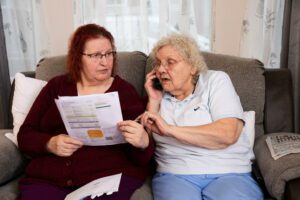Carer’s Allowance and Carers Credit

Carer’s Allowance and Carers Credit are benefits for people who provide regular care to a friend, neighbour, or family member. According to Carers UK, there could be as many as 10.6 million unpaid carers in the UK – many of whom may be eligible for around £4,000 a year in Carers Allowance, or be able to boost their State Pension entitlement through Carer’s Credit. Find out how these benefits work, who’s eligible and how to make a claim in 2024/25.
Important information
In Scotland Carer's Allowance is called the Carer Support Payment. We'll refer to it as Carer's Allowance in the guide for consistency.
You'll need to be providing at least 20 hours of care a week to access any of the support we talk about below.
A caring role can’t always be easily defined. You may feel like you’re not doing enough to be classed as a carer, when in reality you’re well within your right to claim. This is why the definition the government uses for 'care' is fairly broad and includes everyday tasks such as cleaning and shopping, as well as personal care tasks like bathing and toileting.
What is Carers Allowance
Carer’s Allowance is a state benefit for people who spend 35+ hours each week caring for someone. You don’t need to be related to, or living with the person to claim it.
However if someone else is also providing 35+ hours a week caring for the same person, and has already made a successful claim for Carer’s Allowance, you won’t be able to claim it yourself.
If you are eligible, you’ll receive a weekly rate of £81.90, or £327 each month (if you request a monthly payment instead).
It’s up to you how you spend it to help you with your caring responsibilities. Often people choose to spend it on things like –
- Alternative care costs, such as respite care visits to cover much needed breaks
- Childcare costs if the carer is a parent
- Specialist clothing and equipment
- Travel costs
- Home modifications and accessibility measures
- Practical household items like white goods or appliances
- Leisure activities to support wellbeing
The eligibility conditions for Carer’s Allowance are –
- You must be 16 years of age, or your 16th birthday must be no more than three months away on the day you apply.
- You must be providing care to someone over pension age, for more than 35 hours a week. Care includes, but is not limited to –
- Personal care i.e washing, dressing, toileting
- Helping with cooking
- Assisting with mobility
- Helping with household tasks like cleaning and maintaining a safe environment
- Shopping
- Managing and paying bills
- Helping with attending appointments i.e hospital, GP, Dentist
- Companionship and supervision
- The person you’re caring for must already receives one of the following qualifying benefits –
- Personal independence payment (the daily living component at either the standard rate or enhanced rate)
- Disability living allowance (the care component’ at the middle rate or highest rate)
- Attendance allowance
- Armed forces independence payment
- Adult disability payment (the daily living component at the standard or enhanced rate)
- Constant attendance allowance (either at the basic rate with a war disablement pension, or at or above the normal maximum rate with an Industrial Injuries Disablement Benefit).
- You must have been living in the UK for at least 2 of the last 3 years. If you’re a refugee, or have humanitarian protection status there are special rules in place. However, there may be additional criteria to consider depending on your immigration status or if you’re under immigration control. For example, if you’re seeking asylum, or someone in the UK has pledged to cover your costs of living, claiming public funds such as Carer’s Allowance could break the conditions of your stay. Citizens Advice can provide additional support if you’re unsure how this effects you.
- You must not be in full-time education – you can study for up to 21 hours a week and still make a claim, however you may need to get written proof that your part time course will not exceed this threshold. If you’re studying full-time, you can’t try and claim for holiday periods in-between your studies.
Carer's Allowance may affect other benefits
There are some overlapping benefit rules to be aware of. If the person you're caring for receives a severe disability premium as part of their benefits they'll lose this if you're claiming Carer's Allowance. Therefore it's really important to discuss your claim with them first.
If you yourself are claiming another benefit, the amount you receive may decrease equal to the amount of Carer's Allowance you get. Your total sum of your benefit payments will usually stay the same or increase - you shouldn't be worse off by claiming Carer's Allowance.
If you're receiving a means-tested benefit and are eligible for Carer's Allowance you may unlock extra money too. For example,
If you receive Universal Credit you may get an increase called a ‘carer element’
If you receive Pension Credit or Income-based Jobseeker’s Allowance your benefit may be topped up with something called a 'Carer Premium'.
How much can I earn while claiming Carer's Allowance?
Carer’s Allowance has a weekly earnings limit of £151. If you have a part-time job you’ll need to take home this or less after tax and National Insurance deductions (and expenses, if you’re self-employed).
Financial journalist and campaigner Martin Lewis has been urging the Government to review the earnings threshold on Carer’s Allowance. It’s one of the lowest state benefits and yet has one of the most severe thresholds.
With many benefits, an increase in earnings will lead to a reduction in the amount you receive, however with Carer’s Allowance, going over the weekly earnings cap of £151 by just a penny will mean losing the entire £81.90 payment. It’s estimated that this year 130,000 people lost their entitlement for this reason. Martin Lewis, like many, believes it’s unfair to penalise carers on low pay for maintaining a job while providing unpaid care, especially when situations out of their control can push them over the threshold, for example increases in minimum wage.
Sometimes a breach of the threshold may not be identified straightway. This can mean people continue to receive Carer’s Allowance, and then be asked to return their Allowance overpayments. Therefore it’s really important to tell the Department of Work and Pensions as soon as your circumstances change.
Raising the Profile of Unpaid Carers – Lisa James from Independent Age
We spoke to Lisa James, Campaign Manager for the charity Independent Age about raising the profile of unpaid carers and the issues they face.Is Carer's Allowance taxable?
Carer Allowance is a taxable benefit, but you’ll only pay tax if you have other sources of taxable income – such as a private pension or part time job which when combined with Carer’s Allowance, takes you over the threshold for paying tax.
Can I claim two lots of Carer’s Allowance if I'm caring for a couple?
Unfortunately you can’t get paid extra if you care for more than one person. So, if you’re providing care or support to two different people you must choose which person you’d like to claim your Carer’s Allowance for. To increase your chances of claiming the highest rate of Carer’s Allowance, always claim for the person with the most care needs.
Is there a Young Carer’s Allowance?
While there’s currently no financial benefit for carers under the age of 16, there is help available to protect your rights, and help ensure your loved one gets the care they need.
If someone close to you needs looking after, it’s natural to want to help them. However, it’s really important that you have a choice over how many hours of care you give, and that you still have the opportunity to do things you want to do, and keep up with your education.
The NHS has some guidance on how to look after yourself as a carer, and who to go to for help, as well as details of organisations that support young carers.
How to claim Carer’s Allowance
If you’re ready to apply for Carer’s Allowance the first step is to go to gov.uk if you’re in England and Wales, or mygov.scot if you’re in Scotland.
If you don’t feel confident about completing your application form for Carer’s Allowance, there are a number of advice agencies that can support you. For example, it may help to print out Carers UK’s Carer’s Allowance factsheet, and Citizens Advice claim pack and refer to these as you fill in the form.
You can also get help with your claim by phone, by calling the Carer’s Allowance Unit on 0800 731 0297 (textphone: 0800 731 0317).
3 tips for submitting your Carer's Allowance claim
- Submit your claim online – it’s faster than printing the form and sending it in the post, you’ll also be able to answer some initial questions to check if you’re eligible, which will save you from completing the full form unnecessarily.
- Have the right information to hand – remember, you’ll need details of the person you’re caring for too. We’ve created a guide to the kind of documents and information you’ll need to complete your Carer’s Allowance application here.
- Check if your claim can be backdated – Carer’s Allowance can be backdated for up to three months from the date your claim is submitted.

What is Carers Credit?
To get a full state pension you’ll need to clock up 35 full years in your National Insurance record. Most people usually do this automatically by working in full-time employment for at least 35 years. However, many unpaid carers have gaps in their employment history due to their care responsibilities coming first, which means they can miss out on £1000s in their pension entitlement.
Carers Credit is designed to fill these gaps and boost how much state pension you get. If you’re already claiming Carer’s Allowance there’s no need to submit a claim for Carers Credit as you’ll automatically receive a credit to plug any National Insurance gaps on your record.
You’ll need to be providing at least 20 hours of care a week to be eligible for Carers Credit, and be between 16 years old and pension age. Usually the person you’re caring for will need to be receiving a qualifying benefit (these are the same as those required for Carer’s Allowance). However, in some cases you can ask a health or social care professional to sign the ‘Care Certificate’ part of the claim form in place of a qualifying benefit. \
You can find the claim form online here.
Sources –
- https://www.moneysavingexpert.com/news/2024/05/martin-lewis-jeremy-hunt-carers-allowance/
- https://www.moneysavingexpert.com/family/carer-s-credit-/
- https://www.carersuk.org/help-and-advice/financial-support/carer-s-allowance/
- https://www.carersuk.org/policy-and-research/key-facts-and-figures/
- https://www.gov.uk/carers-allowance/further-information
Read more about paying for care

Funding your care – Find out where to go for funding support
Funding your care Find out where to go for funding support There’s no way around it – social care isn’t free, and working out how

Elder care funding calculator
Care funding calculator Whether you’re looking into residential care, domiciliary care, or something else, our care costs calculator is completely free to use and can

Elderly benefits – get what you’re entitled to
2025 benefits for the elderly – how to top up your income Whether attendance allowance, carer’s allowance, pension credit, council tax reduction, or winter fuel